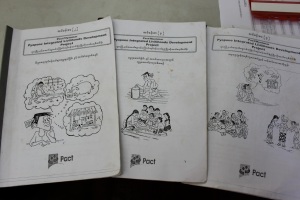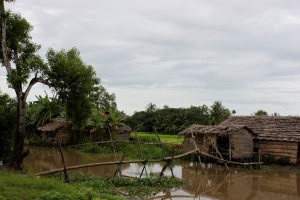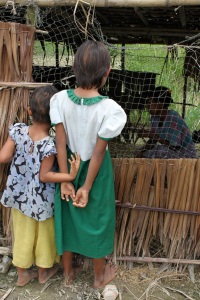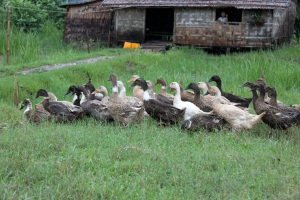You probably guessed from the pictures in my previous post… but yes, our team finally took the much-awaited trip to the Delta region last week where we learned about a micro-finance project run by Pact, one of LIFT’s implementing partners. Pact serves over 3000 clients across several villages in the area and ninety-five percent of its clients are women.
The village we visited, called Mawbi, is in the township of Pyapon- about a two and a half hour drive away from Yangon. The township is one of the few that were severely affected by the 2008 cyclone Nargis. A glimpse of the spalm-thatched stilt homes in a relatively mild monsoon is enough to make one understand how precarious livelihoods are in this region. But despite their hardships and perhaps because of it, the women we met in the village were determined to improve their livelihoods and it was heartening to learn about the progress they were making.
The microfinance program run by Pact combines provision of credit for income generation activities with a community savings component that serves as a safety net mechanism to insure against livelihood threats and disasters. The program in the village of Mawbi has twenty-seven credit and savings groups consisting of 4-5 members each. The program allows women to borrow 60,000 Kyats per year to invest in income-generation activities from setting up a small business to raising livestock (that’s around US$68 at the current exchange rate of about 880 Kyats to the dollar). They meet once every two weeks and make payments of 3,360 Kyats (which includes Ks. 2400 payment of the principal, Ks. 600 interest payment, and Ks. 360, which counts towards the savings).
One of the women we met was 35-year old Khin Mar Shwe. Her husband worked as a casual laborer, but his income wasn’t enough to support their four children- three daughters (of age 15, 10, and 6) and one 13-year old son. Her eldest daughter had migrated to Yangon a year ago to work and her son had also dropped out of school. The younger daughters were still in school, but the ten-year old was unwell all of last year as a result of which she was in the same grade in kindergarten as her younger sister.
Khin Mar Shwe is quite optimistic however and is hopeful that the extra income she is bringing in will help her younger daughters complete school one day. With the help of the micro-finance program, she is raising eighty ducks, which give her about 40 eggs a day. She told us that the eggs sell for 70 kyats a piece.
Women’s economic empowerment has been underway in the villages in the Delta as much out of financial necessity as with the help of livelihoods support provided by organizations like LIFT. In the political sphere, however, many stones remain unturned. Of the eight members nominated to the Mawbi village administration, none are women. When asked why it was so, I got responses (from the men, obviously) claiming that women in the village were too busy or that they had little interest in politics generally.
As ironic as such responses sound- given how popular Aung San Suu Kyi is in this constituency—this attitude is quite common all over Myanmar. And it reflects the reality of women’s representation at the national level. The UN Women’s 2012 Inter-Parliamentary Union report ranks Myanmar at 134 out of 143 countries in terms of women’s representation in the lower house of parliament. According to the report, women’s participation in the upper- and lower- houses of parliament in Myanmar were 1.8 percent and 3.5 percent respectively as of January 2012.
But then again, I guess change doesn’t happen overnight. Economic empowerment is definitely a first step in the right direction. And getting women to participate and lead other decision-making groups in the community, as many of LIFT’s implementation partners currently do, is another.





